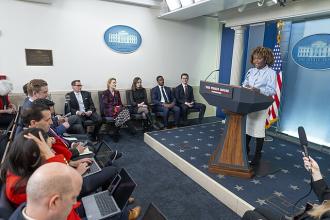It was this week two years ago that Hillary Clinton’s victory looked assured, when the infamous “Access Hollywood” tape of Donald Trump bragging about assault appeared all but certain to end his campaign.
Jesse Ferguson remembers it well. The deputy press secretary for Clinton’s campaign also remembers what happened a month later.
It’s why this veteran Democratic operative can’t shake the feeling that, as promising as the next election looks for his party, it might still all turn out wrong.
“Election Day will either prove to me I have PTSD or show I’ve been living déjà vu,” Ferguson said. “I just don’t know which yet.”
Ferguson is one of many Democrats who felt the string of unexpected defeat in 2016 and are now closely — and nervously — watching the current election near its end, wondering if history will repeat itself. This year, instead of trying to win the presidency, Democrats have placed an onus on trying to gain 23 House seats and win a majority.
The anxiety isn’t universal, with many party leaders professing confidently and repeatedly that this year really is different.
But even some of them acknowledge the similarities between the current and previous election: Trump is unpopular and beset by scandal, Democrats hold leads in the polls, and some Republicans are openly pessimistic.
FiveThirtyEight gives Democrats a 76.9 percent chance of winning the House one month before Election Day. Their odds for Clinton’s victory two years ago? 71.4 percent.
The abundance of optimism brings back queasy memories for Jesse Lehrich, who worked on the Clinton campaign and remembers watching the returns come in from the Javits Center in New York.
“I was getting texts after the result was clear – including even from some political reporters and operatives – texting me, you know, ‘Are you guys starting to get nervous?’ or ‘What’s her most likely path?’” he said. “I was like, ‘What do you mean, starting to get nervous? What path? They just called Wisconsin. We lost.’”
“People were so slow to process that reality because they just hadn’t considered the possibility that Donald Trump was going to be the next president,” he continued.
Lehrich said he sees similarities between 2016 and 2018. But he said he thought Democrats were cognizant of the parallels and determined not to let up a month before the election, as many voters might have two years ago.
Other Democratic leaders aren’t so sure. Asked if he thought his party was overconfident, Democratic Rep. Seth Moulton responded flatly, “Yes.”
Democrats could win a lot of House seats, he said, or could still fall short of capturing a majority.
“The point is that we’ve got to realize that this not just some unstoppable blue wave but rather a lot of tough races that will be hard-fought victories,” Moulton said.
If Democrats are universally nervous about anything after 2016, it’s polling. The polls weren’t actually as favorable to Clinton and the Democrats as some remember, something 538’s Nate Silver and some other journalists pointed out at the time.
But Clinton’s decision not to campaign in a state she’d lose, Wisconsin, and the failure of pollsters everywhere to miss a wave of Trump supporters in red areas are mistakes Democrats are still grappling with today.
“Clearly last cycle, polling was off,” Ben Ray Lujan, chairman of the Democratic Congressional Campaign Committee, told reporters last month. “There were a lot of predictions that were made last cycle that didn’t come to fruition.”
Lujan emphasized in particular how pollsters missed the rural vote, calling it a “devastating mistake.” He said the DCCC has taken deliberate steps since 2016 to get it right this time around, but underscored a congressional majority still required a tooth-and-nail fight.
“So I’m confident with the team that’s been assembled, but I’m definitely cognizant of the fact we need to understand these models and understand the data for what it is,” he said.
One Democratic pollster said the data he’s seen makes plain that the party is favored to win a majority — but that it’s still not a sure thing. He said even now it’s unclear if the political environment will create an electoral tsunami, or merely a good year where Democrats might still fall short of a House majority.
“We’ve all learned a lesson from 2016 that there are multiple possibilities and outcomes,” said the pollster, granted anonymity to discuss polling data one month before the election. “And if you haven’t learned that lesson, shame on you. That 20 percent outcome can happen. That 30 percent outcome can happen.”
This year, Democrats have history on their side: The incumbent president’s party historically struggles during midterm elections. That wasn’t the case in 2016, when Democrats were trying to win the presidency for three consecutive terms for the first time in their history since Franklin Delano Roosevelt (The GOP accomplished the feat only once in the same period, with Ronald Reagan and George H.W. Bush.)
Some Democratic leaders say the reality of Trump’s presidency — unlike its hypothetical state in 2016 — changes the dynamic entirely.
“Democratic energy is at nuclear levels,” said Steve Israel, a former DCCC chairman. “Democrats would crawl over broken glass to vote in this election.”
Israel said he still has concerns about November (political operatives always have concerns about the upcoming election). But he waves away the notion that the party might fall short of a House majority.
“Most Democrats and a heck of a lot of Republicans I speak to believe that Democrats will have the majority,” he said. “The real question is, by how much?”
Ferguson is, of course, of two minds: He thinks the push to repeal the Affordable Care Act and the day-to-day reality of Trump’s presidency fundamentally changes how voters will see this election.
But he’s also gun-shy about what could change in the next month, after the multitude of surprises that occurred during the last month of the 2016 race, whether the “Access Hollywood” recording or then-FBI Director James Comey’s announcement that the investigation into Clinton’s emails was re-opened. Read more at Mcclatchydc.com















